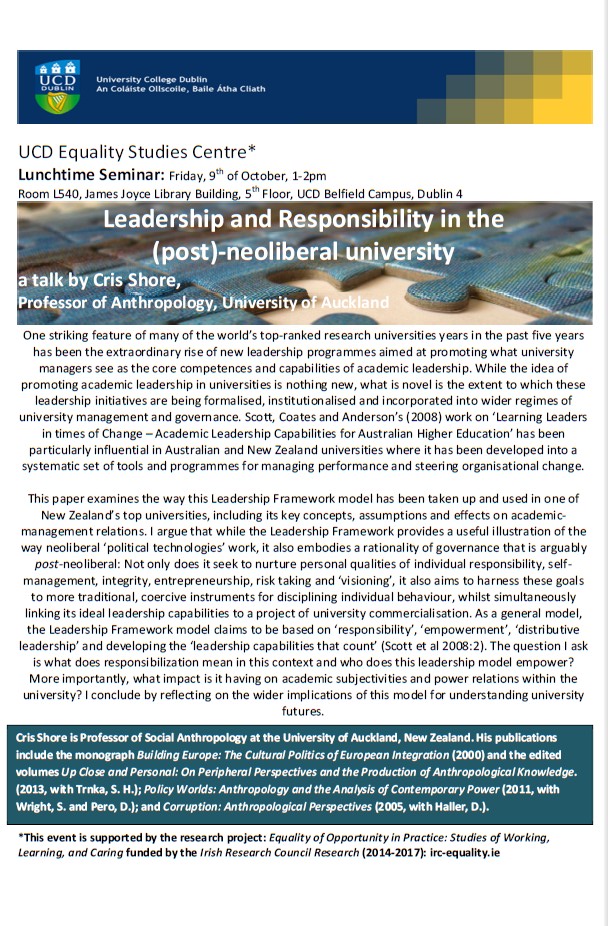UCD Equality Studies Centre*
Lunchtime Seminar: Friday, 9th of October, 1-2pm
Room L540, James Joyce Library Building
5th Floor, UCD Belfield Campus, Dublin 4
Leadership and Responsibility in the (post)-neoliberal university
a talk by Cris Shore,Professor of Anthropology, University of Auckland
—
Abstract
One striking feature of many of the world’s top-ranked research universities years in the past five years has been the extraordinary rise of new leadership programmes aimed at promoting what university managers see as the core competences and capabilities of academic leadership. While the idea of promoting academic leadership in universities is nothing new, what is novel is the extent to which these leadership initiatives are being formalised, institutionalised and incorporated into wider regimes of university management and governance. Scott, Coates and Anderson’s (2008) work on ‘Learning Leaders in times of Change – Academic Leadership Capabilities for Australian Higher Education’ has been particularly influential in Australian and New Zealand universities where it has been developed into a systematic set of tools and programmes for managing performance and steering organisational change.
This paper examines the way this Leadership Framework model has been taken up and used in one of New Zealand’s top universities, including its key concepts, assumptions and effects on academic-management relations. I argue that while the Leadership Framework provides a useful illustration of the way neoliberal ‘political technologies’ work, it also embodies a rationality of governance that is arguably post-neoliberal: Not only does it seek to nurture personal qualities of individual responsibility, self-management, integrity, entrepreneurship, risk taking and ‘visioning’, it also aims to harness these goals to more traditional, coercive instruments for disciplining individual behaviour, whilst simultaneously linking its ideal leadership capabilities to a project of university commercialisation. As a general model, the Leadership Framework model claims to be based on ‘responsibility’, ‘empowerment’, ‘distributive leadership’ and developing the ‘leadership capabilities that count’ (Scott et al 2008:2). The question I ask is what does responsibilization mean in this context and who does this leadership model empower? More importantly, what impact is it having on academic subjectivities and power relations within the university? I conclude by reflecting on the wider implications of this model for understanding university futures.
—
Cris Shore is Professor of Social Anthropology at the University of Auckland, New Zealand. His publications include the monograph Building Europe: The Cultural Politics of European Integration (2000) and the edited volumes Up Close and Personal: On Peripheral Perspectives and the Production of Anthropological Knowledge. (2013, with Trnka, S. H.); Policy Worlds: Anthropology and the Analysis of Contemporary Power (2011, with Wright, S. and Pero, D.); and Corruption: Anthropological Perspectives (2005, with Haller, D.).
—
*This event is supported by the research project: Equality of Opportunity in Practice: Studies of Working, Learning, and Caring funded by the Irish Research Council Research (2014-2017): irc-equality.ie

